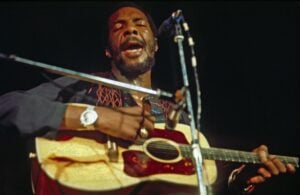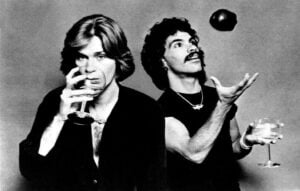10 Classic Rock Albums You Won’t Skip a Track On

via MetalHead5023 / YouTube
There’s a certain magic that happens when an album refuses to let go. One track rolls into the next, and suddenly, you’re not just listening to songs—you’re immersed in a complete experience. These aren’t background playlists or collections of greatest hits. These are cohesive, intentional works of art where each track is essential to the whole.
Critics have long shaped our understanding of what makes an album great, but time has a way of proving which records truly hold up. While trends fade and new styles emerge, some albums remain untouchable—not because they’re nostalgic, but because they’re nearly flawless. These records don’t ask for your attention—they demand it, from the opening riff to the final note.
This list doesn’t aim to rank or stir debate. Instead, it celebrates albums that embody what classic rock does best: transport you, challenge you, and leave no room for the skip button. Here are 10 classic rock albums that have no skippable tracks.
1. Led Zeppelin III – Led Zeppelin (1970)
By their third album, Led Zeppelin proved they were more than just heavy blues and bombastic riffs. Led Zeppelin III saw the band retreat to a cottage in the Welsh countryside, where they let acoustic guitars and folk influences seep into their songwriting. Tracks like “Gallows Pole” and “That’s the Way” reflect a softer, more introspective side that expanded the band’s sonic palette.
Rather than alienating fans, the album’s shift in tone only deepened the band’s artistic credibility. Even the heavier moments, like “Immigrant Song,” feel balanced by the quieter textures woven throughout the album. This back-and-forth dynamic made it an album that flowed seamlessly, with no need to hit the skip button.
Despite its initial mixed reception, Led Zeppelin III has aged like fine wine. It’s now seen as a turning point in the band’s career, showcasing their versatility and willingness to evolve. Each track contributes to the album’s identity, making it essential listening from start to finish.
2. Led Zeppelin IV – Led Zeppelin (1971)
Few albums have achieved the mythical status of Led Zeppelin IV. With no official title or band name on the cover, the record invited listeners to judge it solely by the music—and the music delivered. From the thunderous “Black Dog” to the haunting beauty of “Going to California,” every track feels like a piece of classic rock history in motion.
At the center is “Stairway to Heaven,” a song that’s become both a monument and a cliché. But beyond the hits, tracks like “When the Levee Breaks” and “Misty Mountain Hop” contribute to an album that’s remarkably cohesive, despite the band pulling from such a wide range of influences. The result is a record with no filler—each song matters.
Led Zeppelin IV isn’t just a greatest hits album in disguise. It’s a carefully curated statement that showcases the band at their creative peak. Even decades later, it’s hard to find anyone who can justify skipping a single track.
3. Paranoid – Black Sabbath (1970)
Paranoid wasn’t supposed to be the defining blueprint for heavy metal—but it ended up being just that. What started as a quick filler track turned into the title song, and eventually, a landmark album. With crushing riffs and themes that veered into war, madness, and paranoia, Black Sabbath broke new ground for what rock could be.
Tracks like “Iron Man” and “War Pigs” didn’t just sound heavy—they felt heavy, both in sound and subject matter. But even the lesser-known cuts, like “Planet Caravan” and “Fairies Wear Boots,” contribute to the album’s mood, offering a full-spectrum look at a band both experimental and menacing.
It’s no surprise that Paranoid became a rite of passage for hard rock fans. Each song, whether aggressive or atmospheric, adds to the record’s dark charm. You don’t just listen to Paranoid—you absorb it whole.
4. Exile On Main Street – The Rolling Stones (1972)
Recorded in the hazy chaos of a French villa during tax exile, Exile on Main Street is a messy, sprawling, and utterly brilliant double album. The Rolling Stones tapped into blues, gospel, country, and rock to create a gritty sound that’s both loose and tightly wound. It doesn’t offer instant hits, but it rewards full-album immersion.
Songs like “Tumbling Dice” and “Happy” stand out, but it’s the deep cuts that make the album unforgettable. The raw production and layered arrangements give it a lived-in feeling, as if the songs were discovered rather than recorded. Each track has its own ragged soul, making them inseparable from the whole.
At the time of its release, critics weren’t sure what to make of Exile. But over the years, it’s become a fan and critic favorite—an album you keep coming back to. Skipping tracks on this one would mean missing the full, glorious mess of it all.
5. Machine Head – Deep Purple (1972)
Released in 1972, Machine Head cemented Deep Purple’s reputation as pioneers of hard rock. Fueled by tight musicianship and razor-sharp riffs, the album kicks off with “Highway Star” and never lets up. It’s the sound of a band firing on all cylinders, confident in their chemistry and vision.
While “Smoke on the Water” became the immortal anthem, the album offers much more than just that iconic riff. “Lazy” blends blues with virtuosic soloing, while “Space Truckin’” adds a cosmic swagger that keeps things unpredictable. Each track contributes something essential to the experience.
Machine Head isn’t just a showcase of technical prowess—it’s a masterclass in album construction. Every song builds off the last, creating a sense of momentum that carries you straight to the end. It’s rock precision with no dead weight.
6. Raw Power – Iggy & the Stooges (1973)
Raw Power wasn’t meant to be polished—it was meant to be felt. Released in 1973, the album came out swinging with a chaotic energy that would later define punk rock. Co-written by Iggy Pop and guitarist James Williamson, the record abandoned clean production in favor of a sound that felt visceral, unfiltered, and dangerously alive.
With only eight tracks, the album wastes no time. Each song hits hard, whether it’s the distorted swagger of “Search and Destroy” or the slow-burn of “I Need Somebody.” What ties it all together is Iggy Pop’s raw, confrontational delivery—a frontman who sounds as if he’s about to leap out of the speakers and grab you by the collar.
Though not a major hit at the time, Raw Power grew into one of the most influential albums of its era. Its hybrid of jazz-inflected chaos and proto-punk edge still feels contemporary, even decades later. It’s not just that there are no skippable tracks—it’s that every moment on the album feels absolutely necessary.
7. Van Halen – Van Halen (1978)
With their 1978 debut, Van Halen didn’t just arrive—they exploded onto the rock scene. Produced by Ted Templeman, Van Halen introduced the world to Eddie Van Halen’s game-changing guitar style and the wild charisma of frontman David Lee Roth. From the first note of “Runnin’ with the Devil,” it was clear that this band had something special.
The album is a masterclass in tight, punchy songwriting. Tracks like “Ain’t Talkin’ ’bout Love” and their electrifying cover of “You Really Got Me” pack a serious punch, while “Eruption” redefined what a guitar solo could be. Even the deeper cuts, like “Little Dreamer” or “I’m the One,” have the same fire and flair.
There’s no downtime on Van Halen—just one adrenaline rush after another. It’s the kind of record you put on loud and let it carry you. Every track is there for a reason, helping to build one of the most impactful debut albums in rock history.
8. London Calling – The Clash (1979)
London Calling is the album where The Clash transcended their punk roots and embraced a wider musical landscape. Recorded in a garage space with little interference from outsiders, the band was free to experiment, and it shows. The album seamlessly weaves reggae, ska, rockabilly, and straight-up rock into a unified, double-album statement.
While “London Calling” might be the anthem everyone knows, it’s the album’s depth that makes it unforgettable. Tracks like “Spanish Bombs,” “Lost in the Supermarket,” and “The Guns of Brixton” all explore different styles and tones but still feel cohesive. There’s a rebellious, searching spirit that runs through every note.
At 19 tracks, you’d expect a few misfires—but there aren’t any. London Calling is one of the rare double albums where the ambition actually pays off. It’s rich, diverse, and endlessly re-listenable—a record that doesn’t just break genre boundaries but redefines what a rock album can be.
9. Back in Black – AC/DC (1980)
Back in Black wasn’t just a comeback—it was a resurrection. After the tragic death of frontman Bon Scott, AC/DC faced a turning point. Enter Brian Johnson, whose raspy vocals proved the perfect fit for the band’s unrelenting sound. What followed was a 42-minute assault of pure rock energy that became their biggest triumph.
Every track is a punch to the gut—in the best way. From the swagger of “You Shook Me All Night Long” to the stomping power of “Hells Bells” and the raw grind of “Shoot to Thrill,” the band leaves no room to breathe. It’s relentless, loud, and deeply satisfying.
Back in Black isn’t just one of the best-selling albums of all time—it’s one of the most consistent. There’s not a single dip in energy, not a single track that feels like filler. It’s rock distilled to its essence, and skipping a song would feel like breaking the spell.
10. Moving Pictures – Rush (1981)
With Moving Pictures, Rush found the perfect intersection between their complex progressive roots and the streamlined sound of early ’80s hard rock. Released in 1981, the album captured the trio’s technical brilliance while making their music more accessible than ever. The result is a near-perfect blend of precision and power.
The opening track, “Tom Sawyer,” became an instant classic, but that’s just the beginning. “Limelight,” “YYZ,” and “Red Barchetta” all showcase the band’s ability to fuse intricate musicianship with emotional weight. Even instrumental tracks feel alive with purpose and momentum.
What makes Moving Pictures so compelling is how complete it feels. No track overstays its welcome, and each brings something different to the table. Whether you’re into complex time signatures or just great rock songs, this is an album you’ll want to hear all the way through—every single time.












